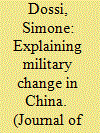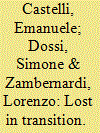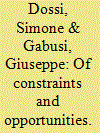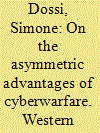| Srl | Item |
| 1 |
ID:
186136


|
|
|
|
|
| Summary/Abstract |
Since the mid-1990s, the operational doctrine of the People’s Liberation Army (PLA) has increasingly focused on jointness. For two decades, however, the PLA’s organizational structure did not adapt accordingly. A major reform was eventually passed in 2015, with the establishment of a new joint operational command system. This 20-year institutional lag is explained by the changing pattern of civilian intervention in military affairs. Even more than doctrinal change, organizational change is likely to be met with resistance from within the military. A facilitating role is then played by civilians who provide external support to pro-reform senior military officers. Yet, such external support depends on the state of civil–military relations, which determines the room for civilian intervention in the military sphere.
|
|
|
|
|
|
|
|
|
|
|
|
|
|
|
|
| 2 |
ID:
178558


|
|
|
|
|
| Summary/Abstract |
Mao’s military teachings have greatly affected the development of modern counterinsurgency. Although the influence of Mao’s doctrine on modern counterinsurgency has been examined, scholarship has failed to highlight that the reception of Mao’s writings and deeds is based on a misreading of his theory and strategy. In the transition from Maoist people’s war to COIN, two aspects of the former were lost. Firstly, for Mao the use of force remained the decisive instrument in war. Secondly, whereas for COIN the security of the population is a crucial goal, for Mao the population was a mere instrument that could be sacrificed if the conditions of the conflict so required.
|
|
|
|
|
|
|
|
|
|
|
|
|
|
|
|
| 3 |
ID:
192170


|
|
|
|
|
| Summary/Abstract |
This article argues that a peculiar pattern of dependent asymmetry – ‘dual dependence’, i.e. a combination of internal and external dependence – has come to characterize the structure of China-Myanmar relations since the late 1980s. The hypothesis we present is that shifts in this pattern of dependent asymmetry account for fluctuations in China-Myanmar relations between 2011 and 2021. We test this hypothesis against empirical evidence from what we identify as two shifts in the structure of bilateral relations: for each, we trace how structural changes were perceived in Naypyitaw and Beijing, and how such perceptions oriented an adjustment in their respective policies. Myanmar’s reduced external dependence on China in 2011–2012 expanded the set of the potential courses of action available to Myanmar’s decision-makers and reduced the set of those available to China; conversely, the opposite happened in 2017–2018, following Myanmar’s return to full-fledged external dependence on China. The paper finally speculates that the military coup in 2021 could well represent a third shift in the structure of bilateral relations, further strengthening Myanmar’s external dependence on China and constraining the military government’s room of manoeuvre.
|
|
|
|
|
|
|
|
|
|
|
|
|
|
|
|
| 4 |
ID:
173809


|
|
|
|
|
| Summary/Abstract |
An issue that has been widely debated in the West is whether cyberwarfare gives militarily weaker actors asymmetric advantages. Is cyberwarfare a weapon of the weak? Or does it rather multiply the advantages enjoyed by militarily superior actors? These questions have major implications for China, which – as a rising power – must face stronger and weaker opponents at the same time. Based on an analysis of the Chinese journal Guofang Keji, this article investigates how China’s strategic community theorises advantage and disadvantage in the cyber domain and how this differs from Western perspectives on cyberwarfare.
|
|
|
|
|
|
|
|
|
|
|
|
|
|
|
|
| 5 |
ID:
160904


|
|
|
|
|
| Summary/Abstract |
The military reform launched in late 2015 has significant implications for China’s civil-military relations. One of the stated goals of the reform is to “uphold the correct political direction” by strengthening party control over the People’s Liberation Army. This has been achieved by centralising power over the PLA in the hands of the Central Military Commission, while at the same time centralising power within the Commission in the hands of its Chairman. This dual centralisation of power might considerably change the way in which the ‘conditional compliance’ model of civil-military relations works in Xi Jinping’s China.
|
|
|
|
|
|
|
|
|
|
|
|
|
|
|
|